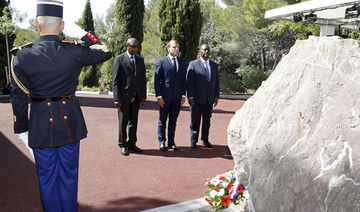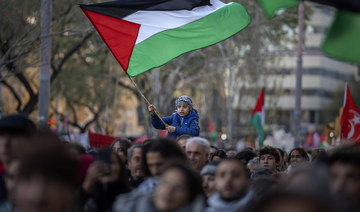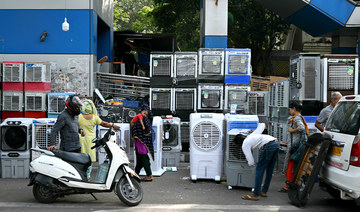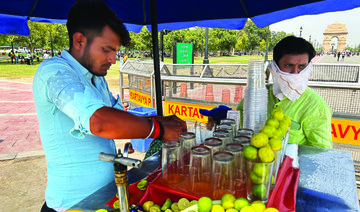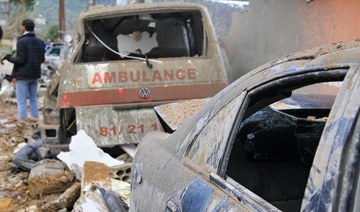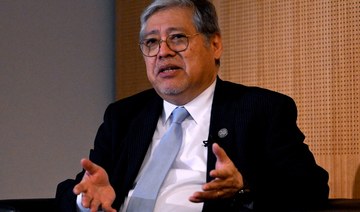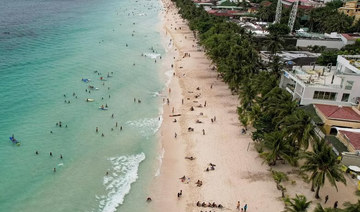PARIS: French President Charles de Gaulle and his wife are being whisked by car through the Paris suburb of Petit-Clamart for a flight back to their country home, when a man on the side of the road waves a newspaper.
The signal has been given.
A group of right-wing extremists spring into action and rake the presidential Citroen DS with gunfire.
Three of the bullets penetrate the bodywork and pass within inches of De Gaulle’s head but he and his wife Yvonne miraculously escape unharmed.
“They’re such bad shots!” France’s World War II hero later jokes about the attempt on his life which shocks the country and gives De Gaulle an opportunity to boost the powers of his office.
Yvonne’s immediate concern meanwhile is for the jellied chicken she has in the boot of the car, having stocked up on the delicacy while in the capital.
Speeding along that summer evening toward a military airfield where they will board a plane taking them to their estate in the village of Colombey-les-Deux-Eglizes, the presidential car is flanked by an escort vehicle and two motorcycle outriders.
Night is falling when the signal comes from the mastermind of the attack, Jean-Marie Bastien-Thiry, an engineer in the Air Ministry with the rank of lieutenant-colonel.
Bastien-Thiry is a member of the Secret Armed Organization, known by its French acronym OAS, a far-right paramilitary group incensed by De Gaulle’s decision to grant independence to Algeria after a brutal eight-year liberation war.
The dozen-strong hit squad is a mix of “pieds-noirs” — Europeans born in Algeria during French rule which lasted from 1830 to 1962 — as well as former soldiers and students. The youngest is just 20 years old.
They open fire first with a machine gun from a yellow van, then from a second vehicle parked further down the road.
The attack lasts just 45 seconds.
More than 150 bullets are fired and there are eight impacts on the car body. One bullet goes through to the back passenger seat, shattering the window by the president and his wife, showered in glass.
The De Gaulles owe a debt of gratitude to the sangfroid of their driver Francis Marroux, who had also been at the wheel a year earlier when the presidential car survived a first assassination attempt — later attributed to Bastien-Thiry — in the northeastern village of Pont-sur-Seine.
Marroux manages to keep control of the vehicle and speeds off on two flat tires under more fire.
De Gaulle’s son-in-law Alain de Boissieu also plays a key role. Sitting in the front of the car he shouts “Get down, father!” to France’s leader.
The unflappable De Gaulle, aged 71 at the time, initially acts as if nothing has happened. On arrival at Villacoublay military airport he reviews the troops as usual.
But when boarding the plane with Yvonne he admits to de Boissieu: “This time, it was a close shave!“
Jean-Noel Jeanneney, French historian and author of a book on the attack, says a combination of factors explains the failure of the 1962 hit, notably that none of those involved were ready to die for the cause.
Interviewed by AFP in 2012, one survivor of the cell blamed weapons jamming and shooters not being sufficiently trained.
“They’re such bad shots,” De Gaulle tells Prime Minister Georges Pompidou in a phone call on the night of the attack.
News of the assassination attempt spreads quickly.
“Failed attack against De Gaulle” AFP writes in a first “flash” at 8:55 pm.
Another follows: “Shots were fired shortly after 8:00 p.m. against General De Gaulle’s car near Villacoublay. No one was hit.”
Later it emerges that a man driving in the opposite direction was hit on the hand by a stray bullet but only lightly injured.
The hunt for the culprits is swift and efficient, with one of the suspects spilling the beans on the whole operation after his arrest.
Nearly all those involved are caught, including Bastien-Thiry. Nine men are put on trial, three of whom are sentenced to death.
De Gaulle pardons two of them but refuses clemency for Bastien-Thiry, who is the last person to be executed by firing squad in France on March 11, 1963 at the age of 35.
Ever the strategist, De Gaulle harnesses public outrage over the attack to build support for a constitutional amendment to have the president elected by popular vote, rather than by an electoral college.
The attack he confides to one of his ministers came “at just the right time.”
‘Close shave!’ How De Gaulle escaped assassin’s bullets 60 years ago
https://arab.news/8vrhp
‘Close shave!’ How De Gaulle escaped assassin’s bullets 60 years ago
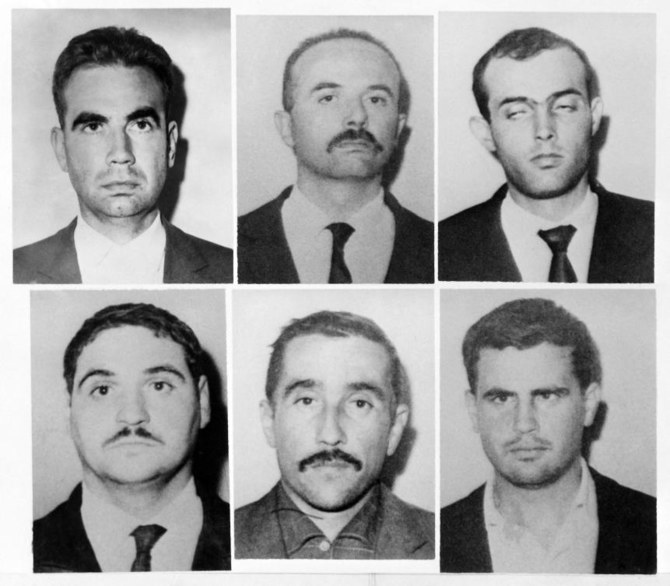
- ‘They’re such bad shots!’ France’s World War II hero later jokes about the attempt on his life which shocks the country and gives De Gaulle an opportunity to boost the powers of his office
- De Gaulle pardons two would-be assassins but refuses clemency for Bastien-Thiry, who is the last person to be executed by firing squad in France on March 11, 1963 at the age of 35
France says conditions not right to recognize Palestinian state
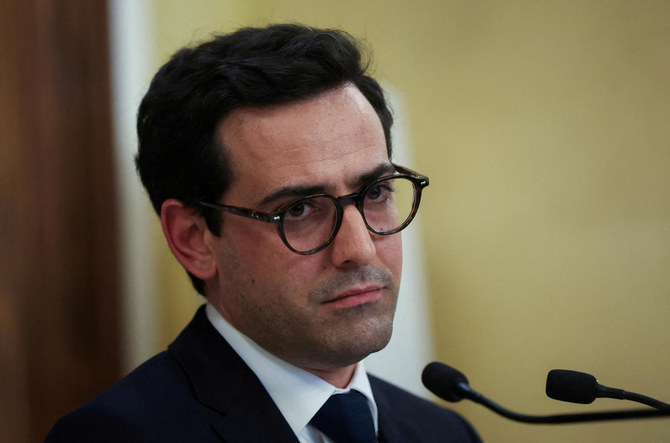
- “France does not consider that the conditions have yet been met for this decision to have a real impact on this process,” Sejourne said
- Paris has previously said recognizing a Palestinian state is not taboo
PRAIS: France said on Wednesday conditions were not right to officially recognize a Palestinian state and that such a decision must be more than just symbolic or political posturing.
Remarks by Foreign Minister Stephane Sejourne distanced France from Ireland, Spain and Norway, which said on Wednesday they would recognize a Palestinian state on May 28, hoping to accelerate efforts to secure a ceasefire in the Gaza war.
“France does not consider that the conditions have yet been met for this decision to have a real impact on this process,” Sejourne said after talks in Paris with Israeli Foreign Minister Israel Katz.
Paris has previously said recognizing a Palestinian state is not taboo, but should be part of a broader effort to achieve a two-state solution between Palestinians and Israelis.
Despite lobbying by several European countries and some Arab states to recognize a Palestinian state, France has said that doing so would do little to change the situation on the ground without genuine negotiations.
“This is not just a symbolic issue or a question of political positioning, but a diplomatic tool in the service of the solution of two states living side by side in peace and security,” Sejourne said.
French diplomats say symbolic recognition will be of no use, especially without real momentum toward a political process supported by the United States, Israel’s main ally.
France has been working on a draft UN Security Council resolution that it hopes to table over the summer.
It wants to bring the parameters for talks on a two-state solution back to the Security Council, while also underpinning clear condemnation of Islamist militant group Hamas after the deadly Oct. 7 attack on Israel that triggered the Gaza war. The negotiating process has been moribund for a decade.
The US believes a Palestinian state should be achieved through negotiations and not unilateral recognition, and has the power of veto at the United Nations.
India on ‘red alert’ over severe heatwave
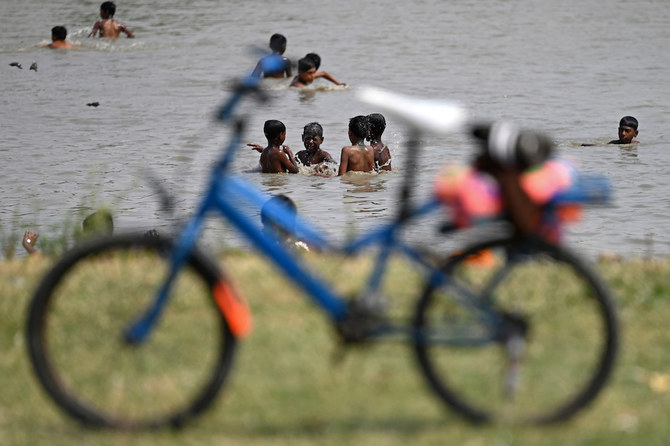
- Heatwaves reached dangerous levels in India, Asian countries since April
- High mercury expected to impact livestock, land transport, power supply
NEW DELHI: Delhi and other parts of northern India were on the meteorological department’s highest alert over severe heatwaves on Wednesday, with temperatures in some regions expected to soar over 47 degrees Celsius.
The India Meteorological Department forecasts heatwave conditions to persist until the end of the week and issued a severe weather warning, known as the “red alert,” in the Indian capital region and the states of Punjab, Haryana, Rajasthan, Chandigarh and West Uttar Pradesh.
Delhi officials ordered schools to shut on Tuesday as parts of the city recorded temperatures above 47 degrees Celsius. Though summer temperatures often peak during May in India, IMD director-general Dr. Mrutyunjay Mohapatra said the warning was necessary for the general public.
“Any heatwave conditions must be taken seriously because it can cause mortality or morbidity if care is not taken,” Mohapatra told Arab News on Wednesday.
The IMD has warned of the “very high likelihood of developing heat illness and heatstroke in all ages” due to the high temperatures. It added that “extreme care” was needed for vulnerable people and that citizens should drink sufficient water even if they are not thirsty.
“People should be under the shades, they should take water so that there is no dehydration,” Mohapatra said.
The severe heat is expected to impact not only people but also livestock, land transport, and the country’s energy supply.
“There is heavy demand in the power sector — there was the highest demand in Delhi yesterday — so therefore there could be disruption in the power supply,” he added.
Santwana Biswas, a domestic worker from Noida on the outskirts of Delhi, is among those who have been dealing with power disruptions in their neighborhoods.
“The electricity situation in my locality has worsened, with the night passing with just a couple of hours of electricity. Imagine, how can I sleep in this heat without a fan? I have not been able to get proper sleep for at least a week now,” Biswas told Arab News.
“Heat hasn’t allowed me to function normally. I am dragging myself just to save my job.”
Heatwaves, most likely fueled by climate change, have been reaching dangerous levels across India and other Asian countries since April, with eastern India experiencing its hottest April on record and reporting deaths related to soaring temperatures.
Saloni Kumari, a housewife in Delhi, said the heat was disorienting.
“Even early in the morning, you don’t feel comfortable going for a walk or doing any work. Air conditioning at home does not work properly when you have high temperatures,” she said.
“Life has become disoriented in this heatwave.”
Attacks on health care in war zones surge 25 percent last year, NGOs say
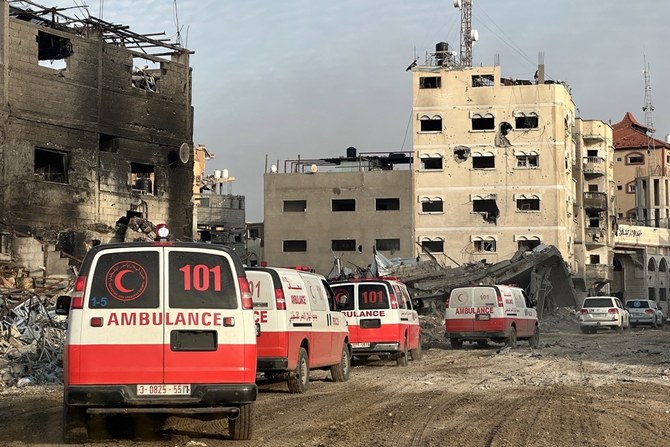
- The Safeguarding Health in Conflict Coalition, composed of 40 groups including medical charities, reported 2,562 incidents
- The group apportions responsibility and said governments were to blame for nearly half of the attacks
GENEVA: Attacks on medics and health facilities in war zones jumped in 2023 to the highest level since records began 11 years ago, a group of non-governmental organizations said on Wednesday, with nearly half attributed to state forces.
The Safeguarding Health in Conflict Coalition, composed of 40 groups including medical charities, reported 2,562 incidents of violence or obstructions including arrests, killings and kidnappings of doctors and strikes across hospitals in 30 conflicts including Gaza, Ukraine and Sudan.
That is up by about a quarter compared with 2022.
Unlike the World Health Organization which also documents attacks on health care, the group apportions responsibility and said governments were to blame for nearly half of the attacks.
Len Rubenstein, chair of the coalition and a Johns Hopkins University professor, called for “far more assertive action to end the scourge of violence against health care,” asking governments to cease arms transfers to perpetrators and press prosecutors to hold them accountable.
The group uses open source data and partner contributions and cross checks to ensure no double counting.
The coalition attributed 489 incidents in Gaza last year to Israeli forces, including medic deaths or injuries and strikes or raids on hospitals. No responsibility had been established in seven other cases, including the deaths of six Israeli military medics killed in fighting in separate incidents between October and December, and the bombing of the Al-Ahli Hospital on Oct. 17, 2023, it said.
Israel, whose military offensive in Gaza began after the deadly Hamas cross-border attacks of Oct. 7, says hospitals in the Palestinian enclave are used by Hamas militants as bases.
Indonesian pilgrim’s journey to Makkah: 60 years of unforgettable memories
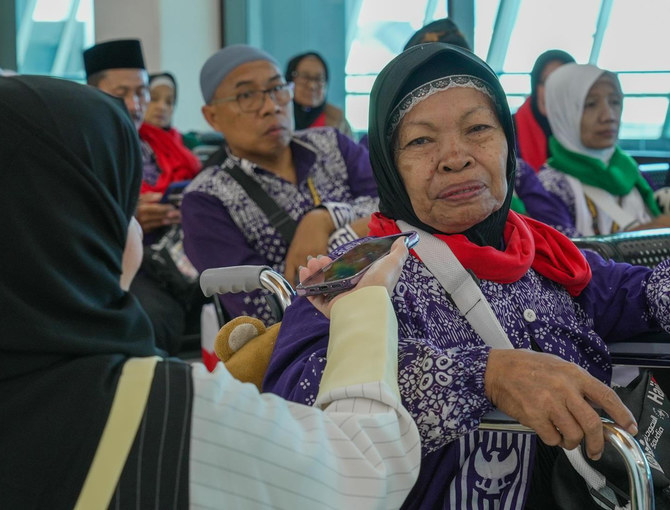
Riyadh: In 1964, six-year-old Indonesian Maryam Mohammad Munir traveled to Saudi Arabia for the first time to perform Hajj with her family. Since then, she has traveled 22 more times to the Kingdom to perform Umrah and Hajj.
In the Makkah Route Initiative hall at Surabaya airport, Munir reminisced about the memories and experiences of her 22 trips.
According to the Saudi Press Agency report, she said that 60 years ago, her family’s first trip to perform Hajj was costly and made on a primitive ship that took five to eight months to arrive in the Kingdom.
These ships would first sail from the port of Jakarta, pass through India, the Arabian Sea and the Red Sea, and then finally arrive at the port of Jeddah.
The journey, she said, was fraught with dangers, challenges and fear. However, her family’s commitment to fulfilling their religious obligations gave them the strength to persevere through the hardships they encountered along the way.
Munir also talked about Indonesians’ traditions surrounding Hajj in the past. The pilgrims would all gather in Jakarta and bid farewell to their family members before setting off. After completing Hajj and returning home, the pilgrims’ families would warmly welcome them with various gifts, celebrating their safe return and the fulfillment of their religious journey.
She said that with development, travel to Makkah has become much easier, which has led to an increasing number of pilgrims traveling to the holy city.
Munir expressed sincere thanks and appreciation to the Saudi leadership, which, she said, continues to exert great efforts to serve pilgrims from all over the world and help them perform Umrah and Hajj with ease.
Indian pilgrims arrive in Makkah
Mutawifs of Arabs Hajj Company (Ashraqat) subsidiary Rahlat wa Manafi Company has welcomed the first group of pilgrims from India who arrived in Makkah for this year’s Hajj season.
The first group consisted of some 2,500 pilgrims distributed in three centers, the SPA reported.
Rahlat wa Manafi Company CEO Ahmad Tamar said that the company strives to provide the utmost comfort to pilgrims, helping them perform their rituals with ease, according to instructions from King Salman regarding visitors, Umrah performers and pilgrims.
The Indian pilgrims expressed gratitude for the efforts exerted by the government of King Salman and Crown Prince Mohammed bin Salman to provide the best services for pilgrims. They also voiced appreciation for the warm hospitality and reception.
Gaza refugee stories bring Filipinos closer to Palestinians
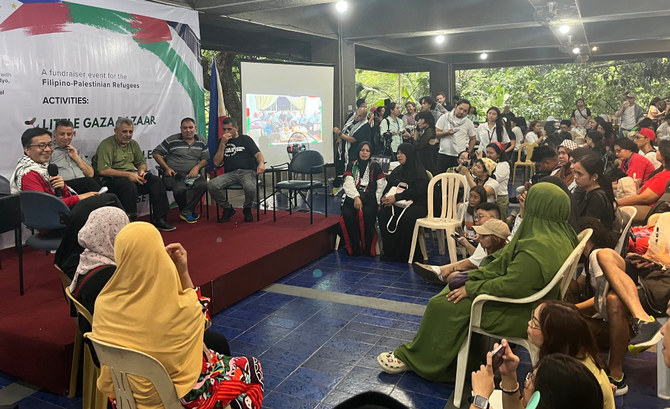
- Nearly 150 Filipino-Palestinians were evacuated from Gaza by the Philippine government
- Their stories give Filipinos a new perspective as the narrative used to be dominated by Israel
MANILA: In 2023, Jehan Alabadla, 22, was in her senior year at the Islamic University of Gaza, where she was set to graduate from the school’s biotechnology program.
She was forced to flee her home in November — weeks after Israel started its deadly onslaught on the Gaza Strip — to seek shelter in the Philippines, her mother’s native country, leaving behind her Palestinian father and half-siblings, who now live, displaced, in tents. Alabadla speaks with them whenever she can, but it is not easy as communication lines have been destroyed.
“It is really hard, this is not the life I was used to in Gaza,” she told Arab News.
“With the war, it’s like my life has stopped. Right now, my priority is to save a bit, help my dad in Gaza, as well as my siblings because they’re still so little. It makes me cry because they’ve gotten so thin.”
Alabadla is one of nearly 150 Filipino-Palestinians evacuated from Gaza by the Philippine government — many leaving their homes, livelihoods, and often also loved ones.
She shared the story of her hometown and family in Gaza with over 1,000 people who gathered at the University of the Philippines on Sunday, for an event meant to support the evacuee families and bring them closer to the community.
Among them was also Zenith Abudalal, who returned to the Philippines with her Palestinian husband, children, and grandchildren.
She recalled their harrowing experiences in Gaza amid the Israeli attacks which since October have killed more than 36,000 people, wounded more than 80,000, and destroyed most of the enclave’s infrastructure.
As Philippine authorities were trying to bring her family to safety, they had to walk 8 km to the border with Egypt. Holding white flags, they were instructed to focus on their path, not to stop, not to look to their sides, not to react when Israeli soldiers called them.
“We walked. Our streets were filled with the dead. Severed limbs, heads, bodies,” she said. “We just prayed hard so we can reach our destination ... It was so difficult.”
The stories have given the Filipino audience a new perspective, where until now, their knowledge has been dominated by pro-Israeli narratives that utilize the Holocaust and World War II and have for decades marginalized Palestinian voices.
“We often hear about the plight of the Jews, but the Jews or Israelis are not the only victims ... The Palestinians have been driven off their land for a long time,” said Alexa Villano, a resident of Quezon City.
Manila-based writer Michiko Manalang, who brought her parents to the meeting, said that the refugees’ stories made them see things differently.
“I think the event gave them a different emotional truth, especially after knowing that some young women there were without parents or other loved ones, either because they’re still stuck in Rafah, or they were killed in the invasion,” she said.
“I feel that the world is waking up to the reality that community is where it’s at, and I think that can really change how we live. I feel we cannot go back to the way we lived before.”
Consolidating the refugees and the variety of their experiences is what the event sought to highlight.
“We are hoping with this kind of awareness comes the acceptance from a wider Filipino community,” Darwin Absari, professor at the UP’s Institute of Islamic Studies and a co-founder of the Moro-Palestinians Cooperation Team, told Arab News.
“In terms of raising awareness, I think we have somehow reached it. One thousand is still a small number for us, but those people who went there kept on sharing. So that multiplies. Janine Gutierrez went there with her mom Lot Lot. Aubrey Miles also promoted our event,” he said, referring to celebrity Filipino actresses.
There was an increasing awareness among Filipino politicians too, despite their strong links with the US and its ally, Israel.
Samira Gutoc, a former legislator in Mindanao, said that some were now — unlike before — convinced that the attacks on Gaza should stop, as they have been seeing more and more content giving a human face to the stories told about Palestine.
“And this is not an antisemitic campaign,” she said. “The content is really about human lives and people who care for lives. We have to stand up for human life.”




